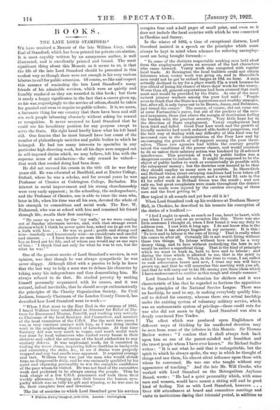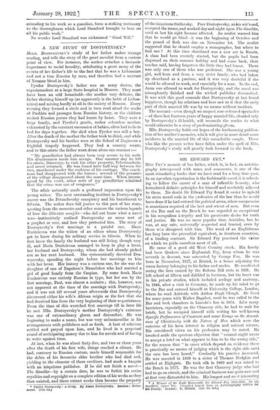BOOKS. .
THE LATE LORD STAbIFORD.*
WE have received a Memoir of the late William _ Grey, ninth Earl of Stamford, which has been printed for private circulation.
It is most capably written by an anonymous author, is well illustrated, and is excellently printed and bound. The most significant thing about this Memoir, as it seems to us, is that
the life of the late Lord Stamford should be presented in this modest way as though there were not enough in his very various labours to callfor public attention. Of course, we like and respect this manner of reminding the late Lord. Stamford's many friends of his admirable services,- which were- as quietly and humbly rendered as they are. recorded in this -book; but there is surely a. happy.significance-in• the fact that a-career given up, as his was, ungrudgingly the-serviemof others, should. be taken for. granted and seem to require no public tribute. It is, we mean, a fortunate thing for our country that there have been and still are such people labouring obscurely without asking for reward
or recognition. It never occurred to Lord Stamford that he could use his hereditary position for any purpose except to
serve the State. His right hand hardly knew what his left hand did. One fancies that he must himself have lost count of the number of philanthropic societies and public bodies to which he belonged. He had too many interests to specialize in any particular high directing work, but all his days were mapped out in self-imposed duties-which, we may believe, left him with the supreme sense of satisfaction—the only reward he valued—
that work that needed doing had been done.
He did .not succeed his cousin in the title till ho was forty years old. He was educated at Bradfield, and at Exeter College, Oxford, where he was a scholar, and for several years he was Professor of Classics at Codrington. College, Barbados: His interest in social improvement and his strong churchmanship were very early apparent ; in the schoolboy, the undergraduate, and the Professor of Classics, one is able -to trace the man who, later in life, when his time was all his own, devoted the whole of his--strength to committees and social work. The Rev.- W. Richmond, who was at school with him and remained his friend - through life, recalls their first meeting :-
" He came up to me, by- the• ivy walls,' as we were coming out of Sunday afternoon service, and,. with that-strange sweet shyness which I think he never quite lost, asked me to ge out for a walk with him. . . . He was so good : gentle and strong and wise—tenderly and humorously wise—so considerate and candid and sincere.. . . I have known no man like him, no man who has so lived out his life, and of whom one would say as one says of him : I thank God not only for what -he was to me, but for what he was.' "
One of the greatest merits of Lord Stamford's services, in our opinion, was that though he was always sympathetic he was never sloppy. Although filled with a passion to help he knew
that the last way to help a man was to debase his character by taking away his independence and thus demoralizing him. He always refused to do that. He studied poverty by making himself personally acquainted with its causes, and it was natural, indeed inevitable, that he should accept enthusiastically
the principles of the Charity Organization Society. Sir Cyril Jackson, formerly Chairman of the London County Council, has described how Lord Stamford went to work :-
"When I first went to the East End in the autumn of 1885, I found William Grey established as Almoner for Relief of Dis- tress for Emmanuel Mission, Ratcliff, and working very actively as Chairman of the local Sanitary Aid Committee, and member of the local committee of the C.O.S. For the next two years I was in very constant contact with him, as I was doing similar work in the neighbouring district of Limehouse. At that time Sanitary Aid was very much in vogue, and much useful work was done by local volunteers who visited every house in their districts and called the attention of the local authorities to any sanitary defects. It was unpleasant work, for it consisted in visiting the worst slums, inspecting lidless dustbins in backyards and. examining the sinks, &c., to see if drains were properly trapped and any bad smells were apparent. It required courage and tact. William Grey was just the man who would _shrink from no disagreeable duty, and he was eminently qualified by his quiet and charming personality to win the complete confidence of the poor whom, he visited. He was not fond of the committee work and preferred ;to be _always among the people.. Thus he took charge of .a few. C.O.S. pensioners and took them their weekly allowance, bringing into their houses the human sym- pathy which was so fully his gift and winning, as he was sure to do, their complete love -and devotion."
The list of societies-to—which-Lord Stamford- gave his services
•
William Earl of Stamford, 1850-1910. London : Christopher.
occupies four and a-half -pages of small print, and even so it does not include the local societies with which he was connected in Cheshire and Surrey.
In the winter of 1893,- a time of exceptional distress, Lord Stamford- insisted in a speech on the principles which must always--be kept in mind when schemes for reducing unemploy- ment are being brought forward:— " In some of the districts respectable working men held aloof from the employment given on account of the bad characters who came forward. Vestry work also competed with regular local trade. At Newington the local builders could not obtain labourers when vestry work was going on, and in Shoreditch men could not be got to unload barges at .10d. an hour. A man actually declined to try for a place worth 27s..a week because he was afraid of losing his chance of three days' work for the vestry. Worse than all, general expectations had been aroused that work must and would be provided by the State. As one of the most earnest pioneer workers among the poor -had said : People seem to think that the State is a mysterious and wealthy stranger, but, after all, it only turns out to be Brown, Jones, and Robinson, just round the corner.' The money, of course, did not come out of some Fortunatus's purse, but out of the pockets of the rate- and taxpayers, those just above the margin of destitution feeling the burden with the greatest severity. Very little hope lay in the direction of State employment. Vestry employment had been tried and failed. Good Poor Law work and the growth of friendly societies had much reduced able-bodied pauperism, and the best way of dealing with any difficulty of this kind was by increased care in the administration of the Poor Law and by encouraging the growth of self-support among the poor them- selves. °Those two agencies had within the century greatly raised the-conditions of the poorer classes, and would, continue to do so unless their salutary action was hindered by ill-advised interference. This provision of work by public bodies was a dangerous course to embark on. It might be supposed to be the object of public bodies to work as economically as possible with the ratepayers' money ; but the doctrine now seemed to be that they should employ as many men as possible. In Shoreditch and Bethnal Green street-sweeping machines had been taken off and men put on at double expense, and a special 2d. rate in the £1 for relief work in Bethnal Green was the result ; and not only so, but great.complaints were made throughout the district that the roads were injured by the careless sweeping of these men and the frost getting in."
How topical it all-sounds and yet how old it is!
When Lord Stamford took up his residence at Dunham Massey Hall, in. Cheshire, he described to his tenants his conception of the duties of a landlord :— " I feel I ought to speak, as much as I can, heart to heart, with you when I meet you on an occasion like this. There was one little sentence I thought of, when I first found it was my duty to address.you. I met with it long ago. I do not know who is the author, but it has always lingered in my memory. It is this : To love and to labour is the sum of living.' That is really what life comes to after all. Certainly life is not worth living without those two things: To -labour without love would be a very dreary thing, and to love without embodying the love in act would be rather a superficial thing. That is the kind of principle which we want to work in, both to love and to labour : and during the time which is allotted to me, that is the spirit in which.I hope tago on. When, in the time to come, I am called to seek adventures brave and new, I trust my son will have grown up, and that he will remember this meeting with you all, and that he will carry out in his life among you those ideas which I have-endeavoured to outline in this rough and simple manner."
Lord Stamford had no toleration for shirkers and it was characteristic of him that he regarded as factious the opposition to the principles of the National Service League. There was no hardship, he used to say, in making everybody qualify him- self to defend his country, whereas there was actual hardship under the existing system of voluntary military service, which. was an undemocratic system of privilege—those- could vote for war who did not mean to fight. Lord Stamford was also a deeply convinced Free Trader.
The effect which was produced upon Englishmen of different ways of thinking by his unaffected devotion may be seen from some of the tributes in this Memoir. Sir Thomas Barlow writes : " I confess that I shall always look back upon him as one of the purest-minded and humblest and the truest people whom I have ever known." Sir Michael Sadler writes : " It is not what he- said that is unforgettable, but the spirit in whichhe always spoke, the way in which he thought of things and saw them, his almost silent influence upon those with whom he conversed. He was one who taught without any appearance of teaching." And the late Mr. Will Crooks, who worked • with Lord Stamford on the Metropolitan Asylums Board, wrote : " He had a quiet personality which, with some men and woman, would have meant a sitting still and be good hind of feeling. Not so with Lord Stamford, however. . . . Over 450 attendances at boand and committee meetings and visits to institutions during that triennial period, in addition to
tattending to his work -as a guardian, form a striking testimony to the thoroughness which Lord Stamford brought to bear on all his public work."
No wonder Lord Stamford was nicknamed " Good Will."



































 Previous page
Previous page